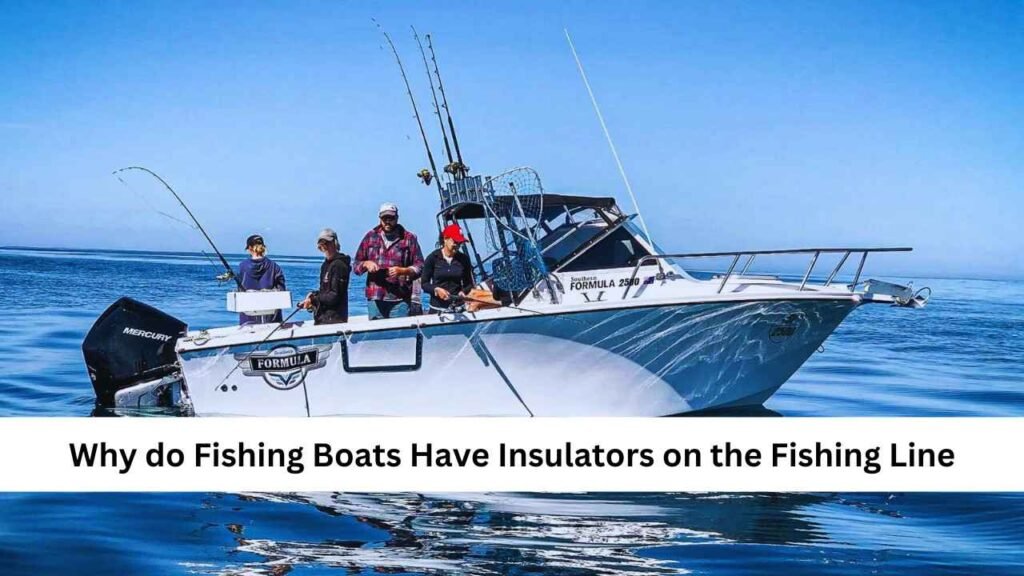Fishing boats have insulators on their fishing lines to keep things safe and efficient. These insulators, often made of rubber or plastic, prevent electricity from traveling through the line. When a fishing line touches the boat, it can pick up electrical signals from nearby devices. If this happens, fish might get scared away, making it harder for fishermen to catch them. The insulators act like a shield, stopping these signals from interfering. When the fishing line is clear of unwanted electricity, it helps fishermen be more successful. Additionally, it protects the fishermen and the boats from electric shocks, keeping everyone safe. Overall, insulators play an important role in fishing, allowing for a better experience on the water.
What are Insulators on Fishing Lines?
Insulators on fishing lines are materials that stop electricity from moving along the line, making fishing safer and more effective. These insulators are usually made from rubber, plastic, or other materials that don’t conduct electricity. They are placed at certain spots along the fishing line or close to the reel. The main job of these insulators is to block electrical currents that can come from nearby devices or nature. By stopping these currents, insulators help prevent fish from getting scared, which can lead to catching fewer fish. They also protect fishermen from getting shocked, making fishing safer and more fun.
Types of Insulators Used on Fishing Lines
Different kinds of insulators are used on fishing lines, and each type is made for specific needs in different fishing places.
- Rubber Insulators: These are popular because rubber doesn’t conduct electricity and is very flexible and strong. They can handle bad weather and keep electricity from passing through.
- Plastic Insulators: Made from different kinds of plastic, these insulators are light and cheap. They are often shaped to fit nicely on fishing lines, keeping everything in good shape.
- Ceramic Insulators: These insulators are not used as much, but they resist heat and electricity really well. They are used in special fishing setups, especially where strong currents might be a problem.
- Composite Insulators: These are made from a mix of materials, giving them great strength, durability, and insulating ability. Composite insulators work well in places with a lot of electrical interference.
How Insulators are Attached to the Fishing Line
Insulators are attached to fishing lines in different ways to keep them in place while fishing. Some common methods are threading the line through the insulator or using loops and clips to hold them. Some insulators can be stuck on permanently with heat shrink tubing or glue. It’s important to attach them correctly to block unwanted electrical currents while still being flexible for changes when fishing.
The Role of Insulators in Fishing Lines
- Stopping Electrical Currents
Insulators block electrical currents from moving along the fishing line, making sure that unwanted signals don’t mess with how the line works. This helps keep both fishermen and the fish safe from electric shocks.
- Less Interference with Fish Finders
Many fishermen use fish finders and sonar to find fish. Unwanted electrical currents can confuse these tools and give wrong information. Insulators help reduce this interference, making it easier to get clear signals and find fish.
- Protecting the Fishing Line
Besides blocking electricity, insulators also protect the fishing line from damage caused by things in the environment and regular use. By creating a non-conductive barrier, they help prevent wear and tear, making the fishing line last longer.
How Insulators Help Fishermen
Insulators are really important for making fishing better for fishermen. First, they stop electrical noise, which helps fishermen talk clearly with their fish finders and sonar tools. This helps them find schools of fish more easily, leading to a better day on the water. Second, insulators protect fishing lines from getting damaged by weather and regular use, making them last longer. This means fishermen can trust their gear for a longer time, so they don’t have to buy new stuff as often. Also, insulators keep everyone safe by blocking harmful electrical currents, protecting both the fishermen and the fish. This makes fishing safer and more fun. Overall, insulators help make fishing trips more successful and enjoyable.
What Types of Fishing Require Insulators?
- Deep-Sea Fishing: In deep-sea fishing, boats use special tools to find fish. Insulators help stop electric noise from messing up fish finders and sonar devices, making fishing trips more successful.
- Surf Fishing: Fishermen on the beach or rocky shores face stronger waves and currents. Insulators protect the fishing lines from electric signals in these areas, helping them communicate better with their gear.
- Ice Fishing: In ice fishing, where lines go into cold water, insulators are very important. They stop electric noise that can scare fish away and help keep the setup stable in the ice.
- Fly Fishing: Fly fishing is usually away from electric noise, but fishing near power lines or devices can still use insulators. They keep the fishing line clear, making the experience better.
- Commercial Fishing: Big commercial fishing boats use different electronic tools for navigation and finding fish. Insulators help these systems work well by reducing electric noise, leading to more catches and safer fishing.
Read Previous – How to BVI fishing ballyhoo fishing
What is the Best Insulator for Heat?
- Fiberglass: This is a popular material used for insulation in homes and buildings. It helps keep places warm or cool and is affordable. It’s light and won’t catch fire, making it a great choice for walls, attics, and basements.
- Mineral Wool (Rock Wool): Made from natural rock or waste materials, this insulation is great at keeping places warm and can resist fire. People use mineral wool in buildings to keep sound in and heat from escaping.
- Polystyrene Foam: This is often found in insulation panels. It’s light and does a good job of keeping heat in. It comes in two types: expanded polystyrene (EPS) and extruded polystyrene (XPS) and is used under floors and in walls.
- Polyurethane Foam: This type of insulation is strong and works well for its thickness. It’s often used in spray form, which expands to fill holes and keeps heat from escaping.
- Cellulose: Made from recycled paper, cellulose is a green choice for insulation. It is treated to resist fire and works well to keep heat in, making it a good option for older buildings.
- Aerogel: Known as “frozen smoke,” aerogel is one of the best materials for keeping heat in. It’s very light and is used in places where saving space and weight is important, like airplanes and advanced tech.
- Reflective or Radiant Barrier: These materials are different because they reflect heat instead of soaking it up. They are often used in attics to help keep homes cool in hot weather by stopping heat from coming in.
What is a Marine Insulator?
A marine insulator is a special device used in water to stop unwanted electrical currents from messing with fishing lines, boat gear, and navigation tools. These insulators are important for keeping things safe and working well on the water because they block stray electrical signals that can interfere with things like fish finders, sonar systems, and communication devices.
Marine insulators are usually made to handle tough conditions, such as being in saltwater, moisture, and sunlight, so they stay reliable and effective. By creating a non-conductive barrier, marine insulators help fishing gear work better and make it safer for fishermen to use their equipment in difficult water conditions.
FAQs
Q1: What do insulators do on fishing lines?
Insulators help stop unwanted electric currents that can mess with fishing gear and fish finders. This makes it easier to use sonar devices and improves the overall fishing experience.
Q2: How do insulators make fishing boats safer?
Insulators protect fishermen and fish from getting hurt by stopping electric shocks from stray currents. This safety feature helps the equipment work well without putting anyone on the boat at risk.
Q3: Do all fishing boats need insulators on their lines?
Not every fishing boat needs insulators, but boats that fish near power lines or in deep waters really benefit from them to be safer and work better.
Q4: Can using insulators help me catch more fish?
Yes, by cutting down on electrical noise and improving fish finders and other tools, insulators can help fishermen find fish more easily, which might lead to catching more fish.
Conclusion
Why do fishing boats have insulators on the fishing line, First, insulators help keep electric noise away from the fishing gear, making it easier for fishermen to catch fish. This helps them have a better chance of a good catch. Second, insulators protect the fishing line from damage caused by bad weather, waves, and regular use. This means the fishing line lasts longer, so fishermen don’t have to buy new gear often. Also, insulators keep fishermen and fish safe from harmful electric shocks. Overall, using insulators makes fishing safer, easier, and more successful, letting everyone enjoy their time on the water.
Stay connected and updated with – PetsGators.com!







